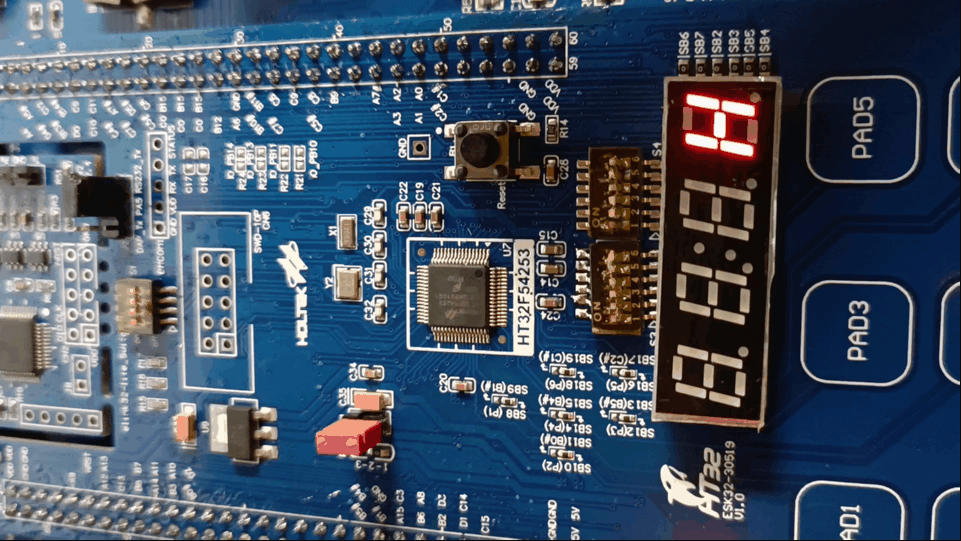- #include "ht32.h"
- #include "ht32_board.h"
- #include "delay.h"
- const u8 disp_nodp_dat[10]={0x3F,0x06,0x5B,0x4F,0x66,0x6D,0x7D,0x07,0x7F,0x6F};
- const u8 disp_dp_dat[10]={0xBF,0x86,0xDB,0xCF,0xE6,0xED,0xFD,0x87,0xFF,0xEF};
- const u8 disp_hello_dat[22]={0x00,0x00,0x00,0x00,0x76,0x79,0x38,0x38,0x3f,0x00,0x76,0x4f,0x5b,0x71,0x6d,0x66,0x5b,0x4f,0x00,0x00,0x00,0x00};
- u8 disp[4]={0x00,0x00,0x00,0x00};
- //u8 disp[4]={0x3F,0x06,0x5B,0x4F};
- u8 ledc_tim_cn=0;
- u8 ledc_tim_flag=0;
-
- void init_ledc(void)
- {
-
- { /* Enable peripheral clock */
- CKCU_PeripClockConfig_TypeDef CKCUClock = {{ 0 }};
- CKCUClock.Bit.AFIO = 1;
- CKCUClock.Bit.PA = 1;
- CKCUClock.Bit.PC = 1;
- CKCUClock.Bit.PD = 1;
- CKCU_PeripClockConfig(CKCUClock, ENABLE);
- }
-
- { /* Configure GPIO as output mode */
- /* Configure AFIO mode as GPIO */
- //AFIO_GPxConfig(GPIO_PB, AFIO_PIN_1, AFIO_FUN_GPIO);
- /* Configure GPIO pull resistor */
- GPIO_PullResistorConfig(HT_GPIOA, GPIO_PIN_0|GPIO_PIN_1|GPIO_PIN_2|GPIO_PIN_3|GPIO_PIN_7, GPIO_PR_UP);
- GPIO_PullResistorConfig(HT_GPIOC, GPIO_PIN_4|GPIO_PIN_5|GPIO_PIN_6|GPIO_PIN_7, GPIO_PR_UP);
- GPIO_PullResistorConfig(HT_GPIOD, GPIO_PIN_2|GPIO_PIN_4|GPIO_PIN_5, GPIO_PR_UP);
- /* Default value RESET/SET */
- GPIO_WriteOutBits(HT_GPIOA, GPIO_PIN_0|GPIO_PIN_1|GPIO_PIN_2|GPIO_PIN_3|GPIO_PIN_7, RESET);
- GPIO_WriteOutBits(HT_GPIOC, GPIO_PIN_4|GPIO_PIN_5|GPIO_PIN_6|GPIO_PIN_7, RESET);
- GPIO_WriteOutBits(HT_GPIOD, GPIO_PIN_2|GPIO_PIN_4|GPIO_PIN_5, RESET);
- /* Configure GPIO direction as output */
- GPIO_DirectionConfig(HT_GPIOA, GPIO_PIN_0|GPIO_PIN_1|GPIO_PIN_2|GPIO_PIN_3|GPIO_PIN_7, GPIO_DIR_OUT);
- GPIO_DirectionConfig(HT_GPIOC, GPIO_PIN_4|GPIO_PIN_5|GPIO_PIN_6|GPIO_PIN_7, GPIO_DIR_OUT);
- GPIO_DirectionConfig(HT_GPIOD, GPIO_PIN_2|GPIO_PIN_4|GPIO_PIN_5, GPIO_DIR_OUT);
- }
-
- }
- void ledc_dig(u8 dig)
- {
-
- if(dig&0x01)
- {
- GPIO_ClearOutBits(HT_GPIOC, GPIO_PIN_4); // GPIO = LOW
- }
- else
- {
- GPIO_SetOutBits(HT_GPIOC, GPIO_PIN_4); // GPIO = HIGH
- }
-
- if(dig&0x02)
- {
- GPIO_ClearOutBits(HT_GPIOC, GPIO_PIN_5); // GPIO = LOW
- }
- else
- {
- GPIO_SetOutBits(HT_GPIOC, GPIO_PIN_5); // GPIO = HIGH
- }
-
- if(dig&0x04)
- {
- GPIO_ClearOutBits(HT_GPIOC, GPIO_PIN_6); // GPIO = LOW
- }
- else
- {
- GPIO_SetOutBits(HT_GPIOC, GPIO_PIN_6); // GPIO = HIGH
- }
-
- if(dig&0x08)
- {
- GPIO_ClearOutBits(HT_GPIOC, GPIO_PIN_7); // GPIO = LOW
- }
- else
- {
- GPIO_SetOutBits(HT_GPIOC, GPIO_PIN_7); // GPIO = HIGH
- }
- }
- void ledc_dat(u8 dat)
- {
- //A
- if(dat&0x01)
- {
- GPIO_SetOutBits(HT_GPIOD, GPIO_PIN_4); // GPIO = HIGH
- }
- else
- {
- GPIO_ClearOutBits(HT_GPIOD, GPIO_PIN_4); // GPIO = LOW
- }
-
- //B
- if(dat&0x02){
- GPIO_SetOutBits(HT_GPIOA, GPIO_PIN_7);
- } else {
- GPIO_ClearOutBits(HT_GPIOA, GPIO_PIN_7);
- }
-
- //C
- if(dat&0x04){
- GPIO_SetOutBits(HT_GPIOA, GPIO_PIN_2);
- } else {
- GPIO_ClearOutBits(HT_GPIOA, GPIO_PIN_2);
- }
-
- //D
- if(dat&0x08){
- GPIO_SetOutBits(HT_GPIOD, GPIO_PIN_5);
- } else {
- GPIO_ClearOutBits(HT_GPIOD, GPIO_PIN_5);
- }
-
- //E
- if(dat&0x10){
- GPIO_SetOutBits(HT_GPIOA, GPIO_PIN_3);
- } else {
- GPIO_ClearOutBits(HT_GPIOA, GPIO_PIN_3);
- }
-
- //F
- if(dat&0x20){
- GPIO_SetOutBits(HT_GPIOA, GPIO_PIN_0);
- } else {
- GPIO_ClearOutBits(HT_GPIOA, GPIO_PIN_0);
- }
-
- //G
- if(dat&0x40){
- GPIO_SetOutBits(HT_GPIOD, GPIO_PIN_2);
- } else {
- GPIO_ClearOutBits(HT_GPIOD, GPIO_PIN_2);
- }
-
- //DP
- if(dat&0x80){
- GPIO_SetOutBits(HT_GPIOA, GPIO_PIN_1);
- } else {
- GPIO_ClearOutBits(HT_GPIOA, GPIO_PIN_1);
- }
- }
- u8 i=0;
- u8 flag=1;
- void ledc_hello(void)
- {
- while(flag)
- {
- disp[0]= disp_hello_dat[i];
- disp[1]= disp_hello_dat[i+1];
- disp[2]= disp_hello_dat[i+2];
- disp[3]= disp_hello_dat[i+3];
- i++;
- if(i>18)
- {
- i=0;
- flag=0;
- }
- delay_ms(500);
- }
- }
- u16 cn=0;
- void ledc_test(void)
- {
- ledc_hello();
- cn++;
- if(cn>1000)
- {
- cn=0;
- }
- disp[0]= disp_nodp_dat[cn/1000];
- disp[1]=disp_nodp_dat[(cn%1000)/100];
- disp[2]=disp_nodp_dat[((cn%1000)%100)/10];
- disp[3]=disp_nodp_dat[((cn%1000)%100)%10];
- delay_ms(200);
- }
- void ledc_test1(void)
- {
- ledc_dig(0x0F);
- if(flag==0)
- {
- ledc_dat(disp_nodp_dat[i]);
- delay_ms(500);
-
- i++;
- if(i>9)
- {
- i=0;
- flag=1;
- }
- }
-
- else
- {
- ledc_dat(disp_dp_dat[i]);
- delay_ms(500);
-
- i++;
- if(i>9)
- {
- i=0;
- flag=0;
- }
- }
-
- }
- void ledc_tim_hdl(void)
- {
- ledc_tim_flag=0;
- ledc_tim_cn++;
- if(ledc_tim_cn>4)
- {
- ledc_tim_cn=1;
- }
- switch (ledc_tim_cn)
- {
- case 1:
- ledc_dig(0x00);
- ledc_dat(disp[0]);
- ledc_dig(0x01);
- break;
- case 2:
- ledc_dig(0x00);
- ledc_dat(disp[1]);
- ledc_dig(0x02);
- break;
- case 3:
- ledc_dig(0x00);
- ledc_dat(disp[2]);
- ledc_dig(0x04);
- break;
- case 4:
- ledc_dig(0x00);
- ledc_dat(disp[3]);
- ledc_dig(0x08);
- break;
- default:
- break;
- }
- }
2.2、ledc.h
- #ifndef __LEDC_H
- #define __LEDC_H
- #include "ht32.h"
- extern u8 ledc_tim_flag;
- void init_ledc(void);
- void ledc_test(void);
- void ledc_tim_hdl(void);
- #endif
2.3、main.c
- int main(void)
- {
- s32 input;
- NVIC_Configuration(); /* NVIC configuration */
- CKCU_Configuration(); /* System Related configuration */
- GPIO_Configuration(); /* GPIO Related configuration */
- RETARGET_Configuration(); /* Retarget Related configuration */
-
- init_ledc();
- delay_init();
- init_timer();
-
- HT32F_DVB_LEDInit(HT_LED1);
- HT32F_DVB_LEDInit(HT_LED2);
- HT32F_DVB_LEDInit(HT_LED3);
- HT32F_DVB_LEDOff(HT_LED1);
- HT32F_DVB_LEDOff(HT_LED2);
- HT32F_DVB_LEDOff(HT_LED3);
-
-
- while(1)
- {
- HT32F_DVB_LEDToggle(HT_LED1);
- delay_ms(1);
- //HT32F_DVB_LEDOff(HT_LED1);
- //delay_ms(1);
- ledc_test();
- }
三、程序运行
上电后,滚动显示“HELLO H32F5423”,然后从0开始计数
